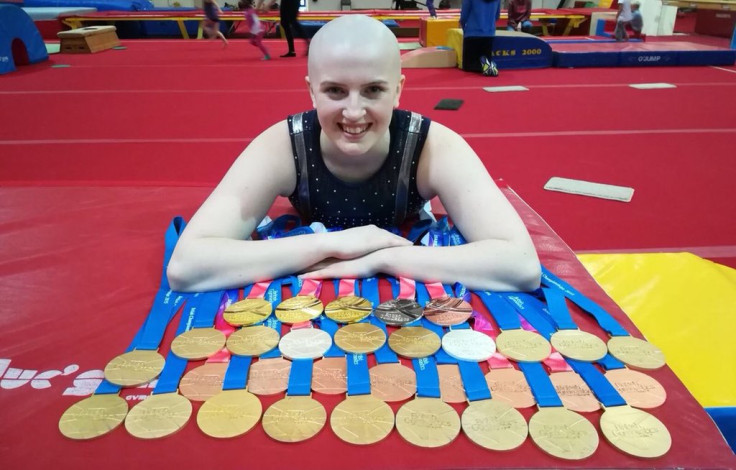What is Mast Cell Activation Syndrome and how did it make a girl allergic to her own hair?
One day she can eat a meal and be fine, the next it could cause her to die.

A gymnast has spoken out about living with an unusual immunological disorder that makes her allergic to her own tears and hair.
Mast Cell Activation Syndrome (MCAS) is a disorder that causes the body to over-respond to triggers such as food or weather. It causes Natasha Coates's scalp to blister when new hair grows. It's so agonisingly painful she often cries in reaction, which then causes a red rash down her face.
"I had caught a cold and started reacting to the virus and it was relentless. I ended up in intensive care because I stopped breathing, which was rather traumatic," she told IBTimes UK.
Since being diagnosed at 18, she has had 250 life-threatening episodes leading to hospitalisation. As a result, her gymnastics training has taken a knock and she has had to cut down. But this hasn't stopped her from going for gold, and as a British disability gymnast she currently has 22 titles to her name. She is the UK's number one disabled gymnast.
"MCAS affects my entire life. From what I eat, what I do, who I'm around and where I go. I constantly have to be on alert to make sure there is nothing in my environment that could potentially kill me."
One day she could eat a meal and everything is fine, and the next she nearly dies. This is because her body's defence system goes into overdrive when it is exposed to factors such as food, perfume or the weather.
"I think it's really important to know that MCAS isn't just being allergic to everything. It's an inappropriate cell response that causes allergic reactions. So it's not that I'm directly allergic to all food, it's that eating causes my cells to break down, which makes me sick."
What is Mast Cell Activation Syndrome (MCAS)
MCAS forms part of a range of mast cell disorders involving proliferation and/or excessive sensitivity of mast cells – a type of white blood cell.
It can come on suddenly, affecting both children and adults, sometimes in family groups, and mimics many other conditions, according to Mast Cell Action.
Everyone has mast cells that react to foreign bodies and injury by releasing chemicals. In a healthy person this action will be done beneficially to aid recovery. In someone with MCAS the same chemicals are triggered at the wrong time and result in negative effects. Among the triggers are a variety of different foods, exercise, chemicals, fragrances and stress.
They are triggered by other factors including alcohol, temperature extremes, exercise, emotional stress and hormonal changes such as during a woman's menstrual cycle, according to a research paper.
What are the symptoms?
Symptoms are vast in nature but common ones include dermatological effects such as hives, burns or a burning feeling, as well as light-headedness, nausea, vomiting, diarrhoea, brain fog, headaches, conjunctivitis and fatigue.
How is it treated?
Antihistamines are commonly used (these are split into H1 and H2 categories), mast cell stabilisers (which are used to control certain allergic reactions), an enzyme inhibitor called antileukotriene, and non-steroidal anti-inflammatory drugs such as aspirin that can help with inflammation.
Aside from medication, lifestyle changes can also help such as avoiding triggers. Since MCAS symptoms can react during an exposure to new things, this is often quite difficult to strictly follow.
A low histamine diet and other elimination diets can be useful in identifying foods that trigger or worsen symptoms.






















